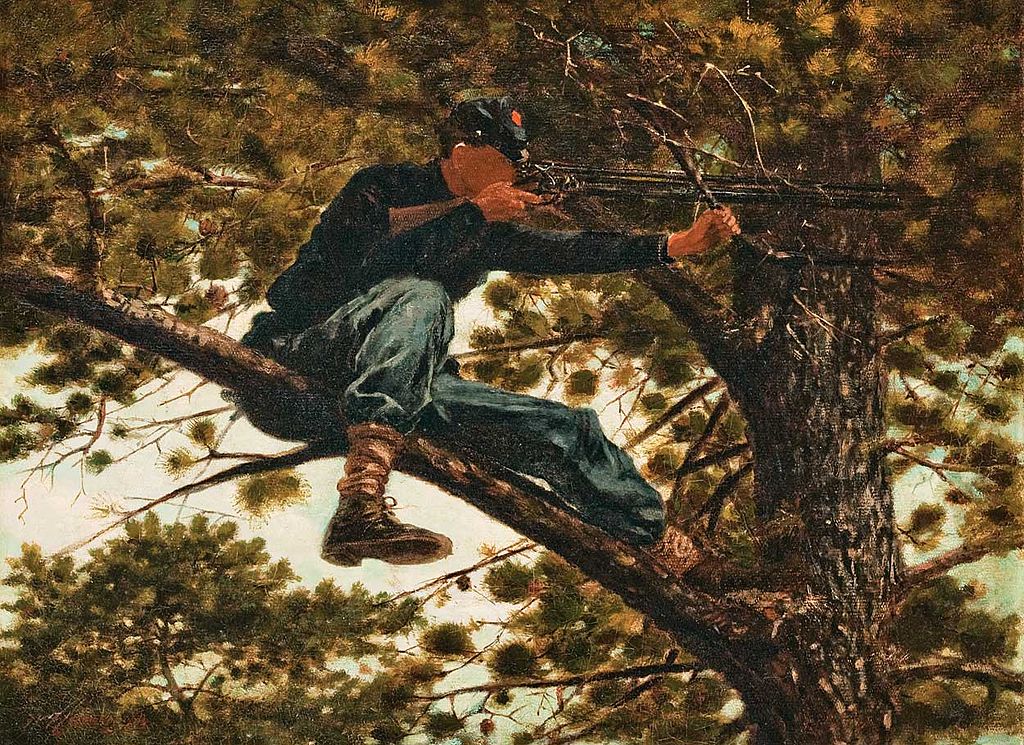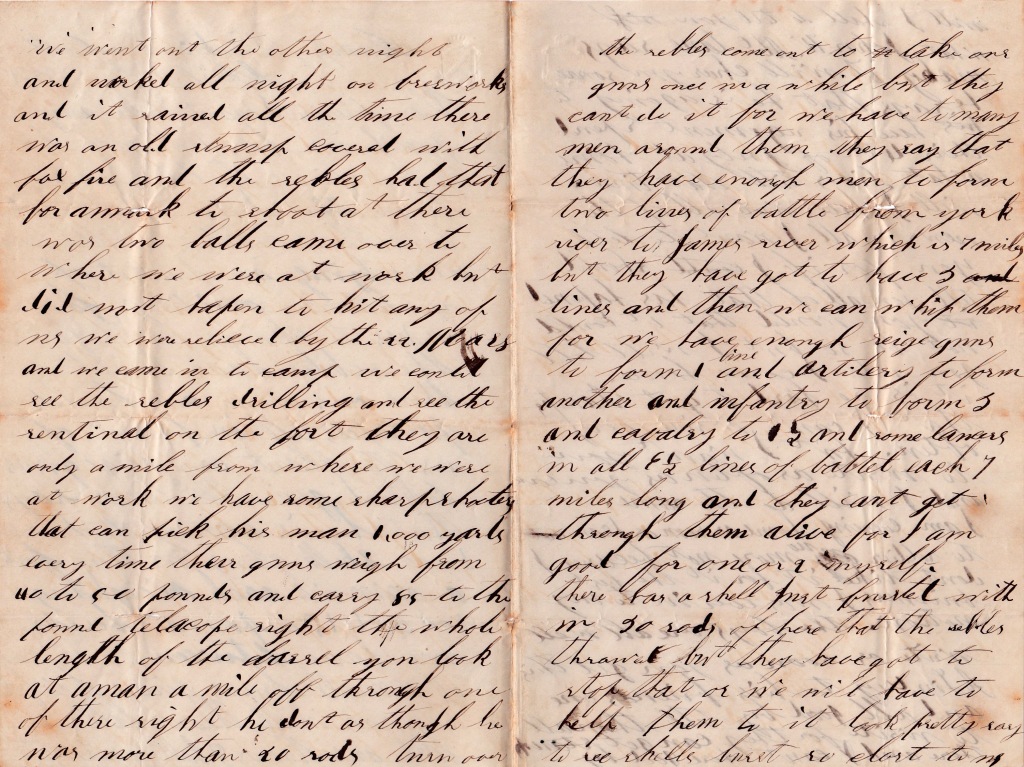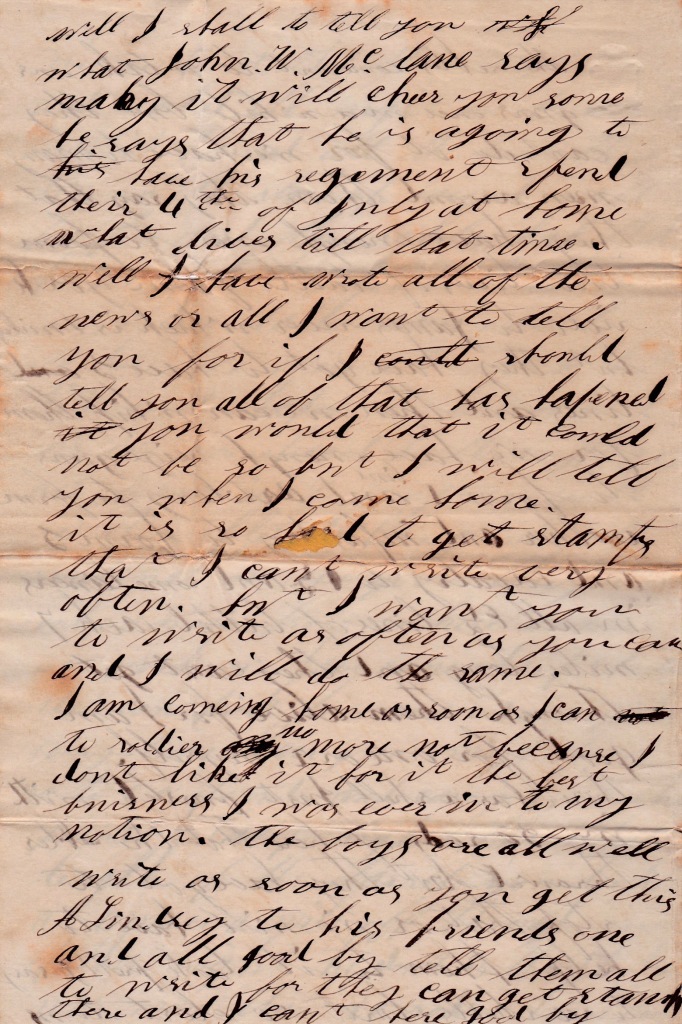
This letter was written by twenty-seven year-old Almiron Martin Lindsey (1835-1862), the son of Archibald Lindsey (1807-1890) and Ruth W. James (1811-1888) of Rockdale, Crawford county, Pennsylvania.
Almiron enlisted on 26 August 1861 in Co. E, 83rd Pennsylvania Infantry. He was killed in the Battle of Malvern Hill on 1 July 1862. According to the regimental history, the 83rd Pennsylvania “was posted [during the night] on the picket line, where, on the following day, was fought the battle of Malvern Hill. From four to six o’clock in the afternoon of July 1st, it was under a heavy artillery fire, after which it was hurried to the front, to support a battery which was in danger of being captured. Here for two hours the battle raged with great fury, and the men were exposed, without protection, to a murderous fire. With great gallantry and courage the line was maintained, and the battery, which had been on the point of moving to the rear, unlimbered and poured into the enemy’s massed lines grape and canister, until the ammunition failed, when the gunners cut the chains from their horses’ harness and hurled them at the foe. Never was the bravery and endurance of the Eighty-third put to a severer test. The loss in the engagement was about forty killed, and one hundred and ten wounded, of whom a number afterwards died. Among the wounded was Captain Campbell, in command of the regiment. On arriving at Harrison’s Landing it stacked but about eighty muskets.”
Almiron wrote this letter from Camp Winfield Scott which was located in a dense pine woods within two miles of the Rebel fortifications at Yorktown at a point called Lee’s Mill. Here, the boys of the 83rd were sent out nightly to advance the work of constructing rifle pits with embrasures for heavy ordnance.
[Note: This letter is from the private collection of Jim Doncaster and is published by express consent.]

Transcription
Camp Winfield Scott [near Yorktown, VA]
April 21st 1862
Dear Friends,
I now take my pencil in hand to mark a few lines to let you know that I am well and hope these will [find] you the same.
We are lying in front of Yorktown waiting for orders to charge on the forts the rebels have built there. Our men are building parapets all in front of us to plant our siege guns behind. Gen. McClellan says he is going to have 1,000 shells going in their fort a minute, each weighing 100 and 150 pounds. Besides we have between 100 and 200 of small brass pieces of rifled cannon [that] will throw balls as fast as 9 balls a minute.
“We have some sharpshooters that can pick his man 1,000 yards every time. Their guns weigh from 40 to 50 pounds and carry 85 to the pound telescope right the whole length of the barrel. You look at a man a mile off through one of these sights, [and] he don’t [look] as though he was more than 20 rods [away.]”
We went out the other night and worked all night on breastworks and it rained all the time. There was an old stump covered with foxfire 1 and the rebels had that for a mark to shoot at. There was two balls came over to where we were at work but did not happen to hit any of us. We were relieved by the 22nd Massachusetts and we came into camp. We could see the rebels drilling and see the sentinel on the fort. They are only a mile from where we were at work. We have some sharpshooters that can pick his man 1,000 yards every time. Their guns weigh from 40 to 50 pounds and carry 85 to the pound telescope right the whole length of the barrel. You look at a man a mile off through one of these sights, [and] he don’t [look] as though he was more than 20 rods [away.]
The rebels come out to take our guns once in awhile but they can’t do it for we have too many men around them. They say that they have enough men to form two lines of battle from York river to James river which is 7 miles but they have got to have 3 lines and then we can whip them for we have enough siege guns to form 1 line and artillery to form another and infantry to form 3 and cavalry to to 1 and a half, and some lancers—in all three and a half lines of battle each 7 miles long and they can’t get htrough them alive for I am good for one or two myself.
There [ ], a shell just bursted within 20 rods of here that the rebels throwed but they have got to stop that or we will have to help them to. It looks pretty scary to see shells burst so close to me.
Well, I shall tell you what [Col.] John W. McLane 2 says [and] maybe it will cheer you some. He says that he is a going to have his regiment spend the 4th of July at home what lives till that time. Well, I have wrote all of the news or all I want to tell you for if I should tell you all that has happened, you would [say] that it could not be so. But I will tell you when I come home.
It is so hard to get stamps that I can’t write very often but I want you to write as often as you can and I will do the same. I am coming home as soon as I can to soldier no more—not because I don’t like it for it’s the best business I was ever in to my notion. The boys are all well. Write as soon as you get this.
— A. Lindsey to his friends, one and all.
Goodbye. Tell them all to write for they can get stamps there and I can’t here. Goodbye.
1 Foxfire, also called fairy fire or chimpanzee fire, is the bioluminescence created by some species of fungi present in decaying wood.
2 John White McLane was the Erie County Sheriff before the Civil War. He raised the 83rd Pennsylvania and became its colonel. He led them until 27 June 1862 when he was killed at the Battle of Gaines’ Mill.



